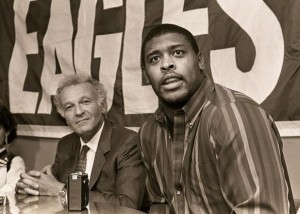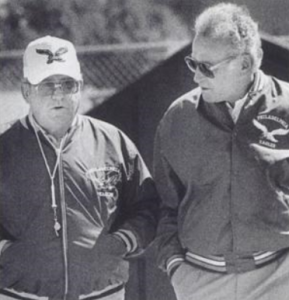Here's a little about him...

To start the puzzle, Norman Braman was a local kid – born in West Chester in 1932. When he was a youngster, the Eagles held training camp in West Chester and his aunt’s house was next door to their training facilities. One summer, he kept going to their practices and wound up being a water-boy.
His family eventually moved to the Cobbs Creek section of the city. There, his father, a Jewish immigrant from Poland, owned a barbershop. His mother, born in Russia, was a seamstress who also worked. So, as you can see, Norman Braman’s roots were not embedded in opulence.
As a teenager, he would go to Shibe Park to watch the Eagles play. Short on funds, he would sneak into the stadium to watch the games.
After attending West Philadelphia High, he matriculated at Temple and graduated in 1955 with a degree in business administration. His first job after college was with Seagram’s in the marketing and sales department. It wasn’t until two years later that he began to separate himself from the masses.
In 1957, working in partnership with his father-in-law, he founded Keystone Stores, a chain of self-service discount clothing stores in Philadelphia. That business led to a string of 46 drug stores – which led to manufacturing pharmaceuticals with Philadelphia Pharmaceuticals and Cosmetics. In 1967, the company went public and Braman became a substantial shareholder.
In 1969, he was presented with an opportunity to sell for a huge profit – and he did. Considering himself retired at 36, he moved to Coral Gables, Florida, with a wife and two young daughters. He bought a home on a canal and found a houseboat docked behind his home.
The owner of the houseboat asked Braman if he could keep the houseboat parked there until Braman moved into his new home. Braman agreed. The owner of the houseboat told Braman to ask if he ever needed the favor returned.
By the way, the owner of the houseboat owned a Cadillac dealership.
In 1972, Braman went to him and mentioned that he was interested in getting into the automobile business. The Cadillac dealer recommended a Chevy dealership that was up for sale in Tampa. Braman purchased the dealership and started selling cars.
Three years later, he bought another automobile dealership, this one in Miami, which he called Braman Enterprises. He then parlayed that dealership into a total of 23 other dealerships in both Florida and Colorado – all of them selling luxury cars. By then, the former Eagles water-boy was close to becoming a billionaire.
In 1982, he started dabbling in football by helping renovate the Orange Bowl for Dolphins owner Joe Robbie.
In 1985, when Braman learned of Leonard Tose’s financial insolvency and his threats to move the Eagles to Phoenix, he stepped in to keep the Eagles in Philadelphia. Together with brother-in-law Ed Leibowitz, Braman bought the Eagles for $65-million.
In Leonard Tose’s final year of ownership of the Eagles, he lost $4-million.
In Norman Braman’s first six years of ownership, the Eagles made a profit of $48.5-million and he bought out his brother-in-law’s share in 1987. Braman was indeed a shrewd businessman, but that would soon become a common complaint among Eagles fans. To their way of thinking, Braman was treating the Eagles too much like a business – and not enough like fun and games.
Braman raised the season-ticket base from 40,000 to 55,000 – but he also tripled the price of season tickets. At the same time, while putting a good team on the field, Braman was pinching pennies when it came to dealing with his players. The Eagles led the league in holdouts and contract disputes.

But seven years later, Braman refused to even make an offer to keep Reggie White with the Eagles. Despite that facts that Reggie White collected 124 sacks and played in seven consecutive Pro Bowls – both club records – Norman Braman allowed the fan-favorite and still-productive Minister of Defense to walk out the door.
Reggie White signed with the Packers and played for another six years in Green Bay – winning the 1996 Super Bowl 35-21 over the Patriots – before finishing his career with a year in Carolina.
Another piece of the puzzle was Buddy Ryan.
Although Braman hired Super Bowl champion Chicago Bears defensive guru Buddy Ryan to coach the Eagles, he never got along with his head coach. By then, Norman Braman had evolved from his common-man beginnings to become a new-money aristocrat. He spent several months a year at his villa in the south of France and tended to Eagles business when it fit into his social schedule. He flew himself back and forth to Philadelphia in his private jet.
Buddy Ryan, on the other hand, was a Kentucky horse-farmer who Braman treated as if he could still smell the manure on Buddy’s boots. Buddy, refusing to treat his boss with respect, called Braman “the guy in France” whenever the press asked a question about Braman.
Ryan led the Eagles to three consecutive winning seasons from 1988 to 1990, but the Eagles were eliminated in the first round of the Playoffs all three years. Rather than deal with someone he neither liked nor respected, Braman replaced Buddy Ryan after the 1990 season concluded. Braman replaced Buddy with Rich Kotite – who in time would become a caricature of incompetence.
When the Eagles started to go downhill under Kotite, Norman Braman barely noticed. By then, he’d detached himself with the day-to-day operations of the team by putting GM Harry Gamble in charge of everything. By the way, Gamble was among the lowest-paid GMs in the league and Braman was among the highest-paid owners at $7.5-million per season.
I’d be remiss if I didn’t mention that Braman was extremely popular with the other NFL owners. Calling for an aggressive approach to marketing NFL properties, the owners put him in charge. The result was that club revenues from merchandise sales increased from $100,000 per year to more than $2-million under Braman’s direction.
But the romance between Norman Braman and the Eagles continued to erode.
By 1994, Norman Braman lost favor with the fans. The team was going downhill on the field while “the guy in France” was making money hand over fist. Fox had just signed up for a $1.6-billion TV contract with the NFL that funneled lots of money into owners’ pockets and new expansion teams in Jacksonville and Carolina added even more.
For Norman Braman, it was time to get out.
In 1994, he sold the Eagles to Jeffrey Lurie for a record $185-million.
Today, Norman Braman is one of the wealthiest men in South Florida and he’s known for his philanthropic contributions.


No comments:
Post a Comment